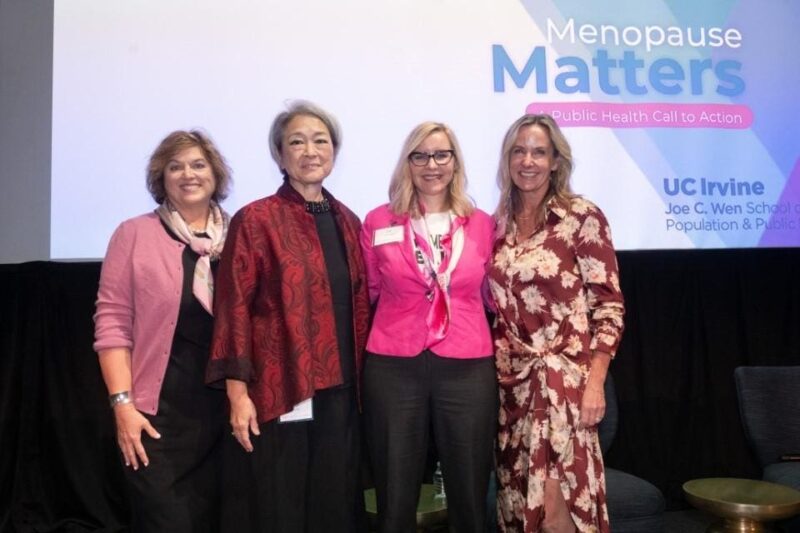From left to right: Bernadette Boden-Albala, Wen Shen, Liz Powell and Gigi Kroll at UC Irvine’s 11th Annual Women’s Health Summit, Menopause Matters: A Public Health Call to Action.
Steven Zylius
Imagine if, this Thanksgiving, every woman across the country — supported by her family, friends and community — began talking openly about menopause. Imagine the conversations at dinner tables, in grocery store aisles, after church services or during holiday gatherings. What if menopause became as natural to discuss as career milestones or college aspirations? If we used this season of togetherness to finally break the silence, we could spark a national movement.
Because the truth is: menopause is not just a personal transition. It is a public health, economic and equity frontier.
Most women enter menopause between 45 and 60. These are peak career years — years when women should be stepping into leadership, earning promotions, shaping the future of their organizations. Yet many women face disruptive symptoms: hot flashes, sleep disturbances, cognitive fog, anxiety. Long term risks include heart disease and metabolic changes. Every woman’s experience is different, but for too many, symptoms derail professional momentum at the exact moment they should be ascending.
And the costs are not just personal — they are national. A recent global analysis by the World Economic Forum found that just nine women’s health conditions account for one — third of the health gap across data availability, care delivery and treatment effectiveness. Closing these gaps could unlock 27 million disability — adjusted life years every year, the equivalent of 2.7 healthy days per woman, per year and generate $1 trillion in annual global GDP by 2040. Menopause is a major part of that equation. Ignoring it is not only inequitable but also economically reckless.
Workplace culture has not caught up to this reality. A national survey by the Society for Women’s Health Research found that more than half of employees and most supervisors report no workplace policies to support women experiencing menopause. Without guidance, women navigate stigma alone and managers lack tools to help. It’s a quiet, preventable talent drain.
But here’s the good news: solutions are simple and they work.
- Workplaces can train managers to recognize and appropriately respond to menopause related needs.
- Companies can offer flexible work schedules.
- Ensure health plans cover menopause related care.
- Create cultures where people can talk about menopause without fear of judgment.
These are the same steps we once took for pregnancy, parental leave and lactation support — steps that many once dismissed as unnecessary or too expensive. And yet, every time we invested in women’s health, the returns, for families, companies and the economy, far exceeded the cost.
Momentum is building. The Menopause Research and Equity Act of 2023 is an important first step in funding the science we need. But policy alone is not enough. Employers must lead now, not after another decade of preventable losses. Countries like Scotland already allow employees to request workplace accommodations for menopause. The U.S. should be bold enough to do the same. And just weeks ago, we held our 11th Annual Women’s Health Summit which underscored that urgency, bringing more than 200 attendees together under the theme “Menopause Matters: A Public Health Call to Action.” It’s clear that the public is ready for this conversation — now policymakers and workplaces must match that momentum.
And this holiday season offers the perfect opening.
As we gather with loved ones, sharing meals, reflecting on the year behind us and imagining the year ahead, we can start normalizing what has long been whispered, ignored or dismissed. These conversations can reshape cultural norms faster than any policy change.
If women feel supported, at home, at work and in society, everyone benefits. Businesses keep experienced leaders. Families gain stability. Communities retain the wisdom and leadership of women in their prime.
Menopause deserves a place in our national conversation, beginning at our holiday tables. Because when we talk about it, really talk about it, we create the momentum needed to turn silence into support, stigma into solutions and an overlooked life stage into a catalyst for equity and economic growth.
This season, let’s give women what they’ve always given to others: understanding, visibility and the chance to thrive.









